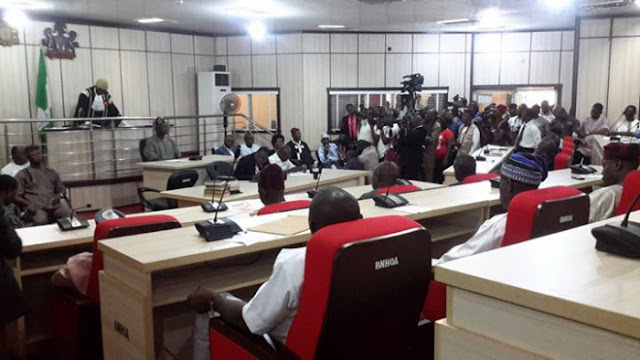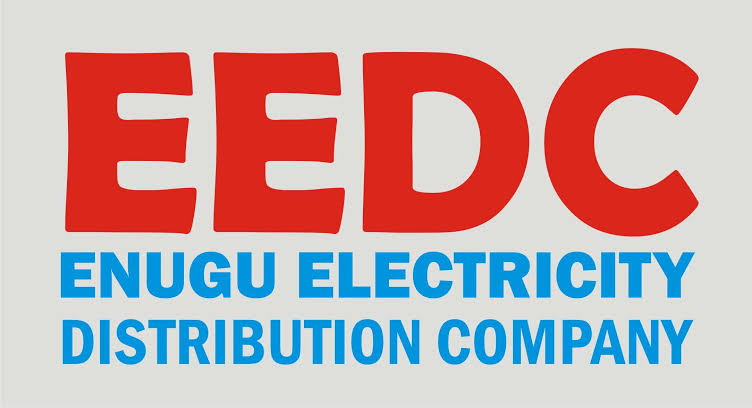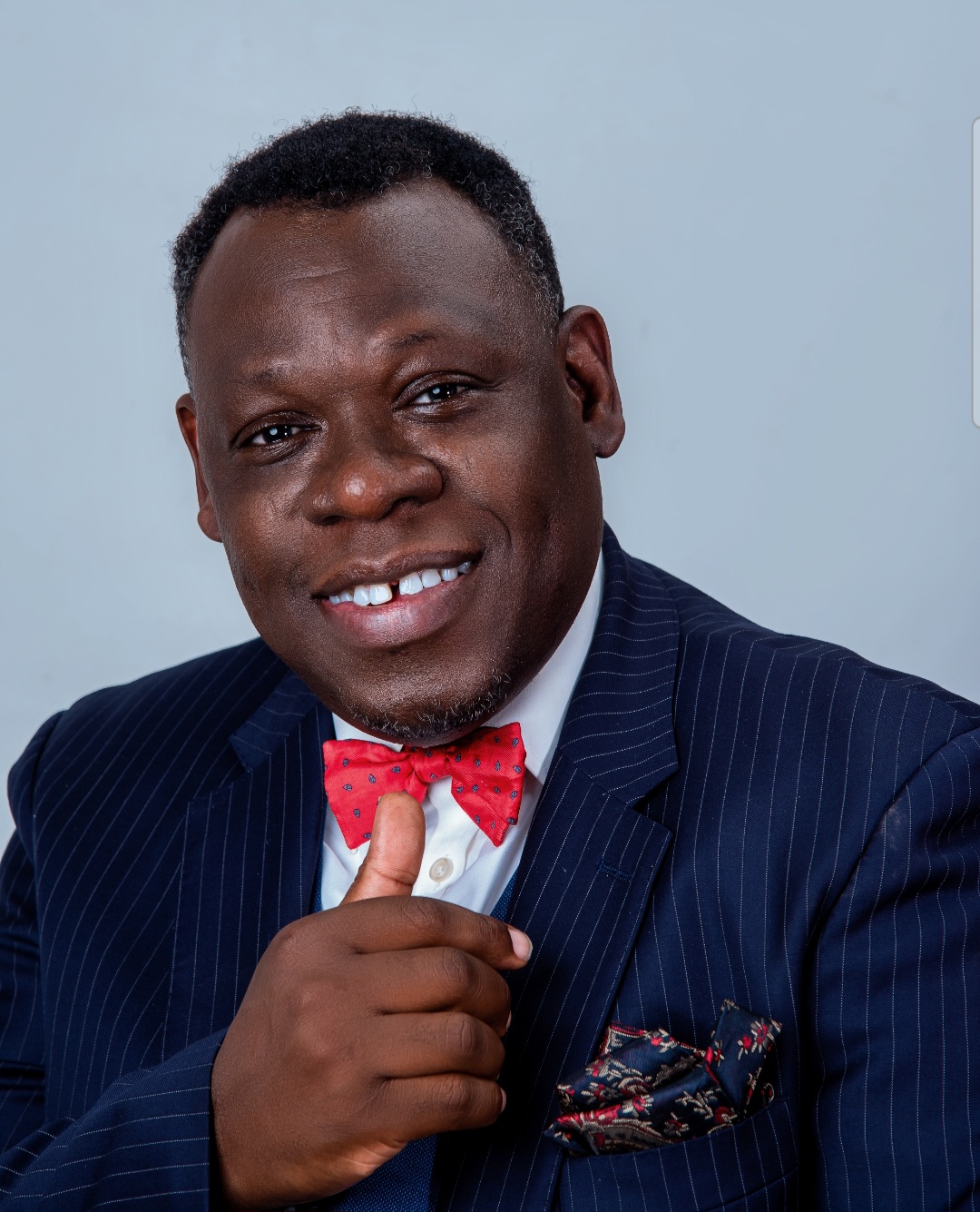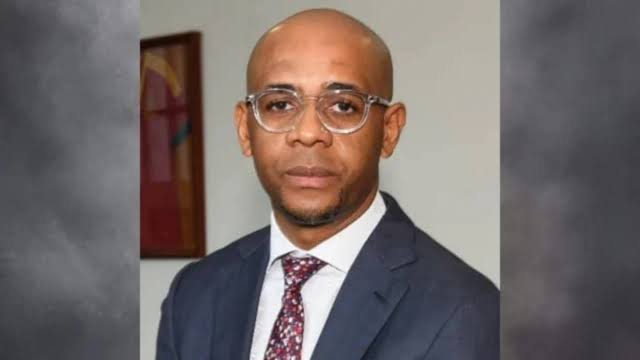Makurdi, Benue State, August 27, 2025 – In a dramatic escalation of political tensions in Benue State, the State House of Assembly has suspended its former Speaker, Hon. Aondona Dajoh, for three months, just days after his abrupt resignation from the leadership position. The suspension, announced during a stormy plenary session on Tuesday, August 26, 2025, stems from allegations that Dajoh orchestrated a plot to impeach Governor Hyacinth Alia, a move that lawmakers claim threatened the state’s political stability. This development, coupled with the reversal of key decisions made under Dajoh’s tenure, underscores a deepening rift within the state’s ruling All Progressives Congress (APC) and raises questions about the balance of power between the executive and legislative arms in Benue State.
A Resignation Under Pressure
Hon. Aondona Dajoh, representing Gboko West State Constituency, resigned as Speaker on Sunday, August 24, 2025, in a handwritten letter titled “Resignation As The Speaker, Benue State House of Assembly.” The letter, made public through various media outlets, stated, “I write to resign my position as the Speaker, Benue State House of Assembly, effective today, August 24, 2025. This is done in good faith and in the best interest of the state.” Dajoh expressed gratitude to his colleagues for the opportunity to serve as “first among equals” and pledged to continue his duties as a legislator.
The resignation came amid a turbulent week marked by internal strife within the Assembly. Just two days prior, on Friday, August 22, Dajoh had suspended four lawmakers—Hon. Alfred Berger (Makurdi North), Hon. Terna Shimawua (Kyan), Hon. Cyril Ekong (Obi), and Hon. James Umoru (Apa)—for six months, accusing them of plotting to destabilize the Assembly through an alleged attempt to impeach him. The suspensions, ordered by Dajoh, included escorting the lawmakers out of the chamber by the Sergeant-at-Arms, a move that intensified the political drama.
Dajoh’s resignation, however, did not quell the tensions. Instead, it paved the way for a rapid realignment of power. On the same day, the Assembly convened an emergency session under heavy security, presided over by Deputy Speaker Hon. Lami Danladi-Ogenyi. In a surprising turn, the suspensions of the four lawmakers were lifted, and Hon. Alfred Berger, one of those previously sanctioned, was elected as the new Speaker. The swiftness of these events, coupled with the unusual timing of a Sunday sitting, raised eyebrows across Benue’s political landscape, with analysts questioning the legality and procedural integrity of the process.
The Suspension: Allegations of an Impeachment Plot
The suspension of Hon. Aondona Dajoh on Tuesday, August 26, 2025, marked a dramatic reversal of fortunes. During the plenary session, Hon. Terna Shimawua, representing Kyan State Constituency, moved a motion of urgent public importance, alleging that Dajoh had convened a meeting at his residence on August 21, 2025, with the intent to initiate impeachment proceedings against Governor Hyacinth Alia. The motion was seconded by Hon. James Umoru of Apa State Constituency, both of whom had been among those suspended by Dajoh the previous week.
Shimawua argued that Dajoh’s actions posed “a direct threat to democratic stability in Benue,” warning that failure to act could plunge the state into a political crisis. The new Speaker, Hon. Alfred Berger, presided over the session and upheld the motion, reducing the proposed six-month suspension to three months without subjecting it to the customary voice vote—a procedural anomaly that has sparked debate about the Assembly’s adherence to its own Standing Orders.
Dajoh, through his media aide Terver Zamber, swiftly denied the allegations, describing them as “baseless and unfounded” and seemingly designed to tarnish his reputation. Zamber emphasized that Dajoh had maintained a cordial relationship with Governor Alia, noting that just days before his resignation, the Assembly under Dajoh’s leadership had passed a vote of confidence in the governor, reaffirming its support for his administration. Dajoh questioned why he was singled out for suspension, asking, “Who were the others the former Speaker allegedly planned to impeach the governor with, and why is the former Speaker the only one facing suspension?”
Accepting the suspension “in good faith,” Dajoh suggested it was a “political maneuver orchestrated by non-state actors and executed by elements within the tenth Assembly.” He reiterated that his resignation was motivated by a desire to maintain peace and stability in Benue, urging the public to disregard attempts to tarnish his image.
Reversals and Confirmations: A Shift in Legislative Dynamics
In a further sign of realignment, the Assembly reversed several decisions made during Dajoh’s tenure. On Tuesday, lawmakers confirmed seven commissioner nominees sent by Governor Alia, including two—Dr. Timothy Yangien Ornguga, a law lecturer at Benue State University, and Hon. James Dwem—who had been rejected under Dajoh’s leadership. The confirmation followed a letter from Governor Alia, who argued that the petitions against the nominees were unsubstantiated, as none had been convicted or indicted by a court.
Notably, lawmakers who had previously opposed Ornguga and Dwem offered no resistance during the Tuesday session, allowing the confirmations to proceed without debate or a voice vote. The other confirmed nominees included Hon. Ugwu Odoh, Hon. Kunde Aondowase, Hon. Kwaghgba Amande, Hon. Joseph Ter Jir, and Hon. Tiza Isaac Imojime. This smooth confirmation process suggests a newfound alignment between the Assembly and the executive, raising questions about the motivations behind the reversals.
The Assembly also lifted suspensions imposed on three government officials: Dr. Grace Adagba, Chairman of the State Universal Basic Education Board (SUBEB); Hon. Maxwell Ogiri, Chairman of Otukpo Local Government Area; and Hon. Michael Upe, Director-General of the State Lottery Board. Speaker Berger, ruling on apology letters from the officials, stated, “To err is human and forgiveness is of God,” urging the governor to reinstate them to prevent further undermining of the Assembly’s authority.
Broader Political Context: A Power Struggle in the APC
The events in the Benue State House of Assembly reflect a deeper power struggle within the APC, particularly between loyalists of Governor Hyacinth Alia and those aligned with the Secretary to the Government of the Federation, Senator George Akume. Dajoh, perceived to be in Akume’s camp, had led an Assembly that asserted its independence, notably rejecting Alia’s commissioner nominees and suspending government officials. This assertiveness, however, appeared to provoke tensions, culminating in the rapid sequence of suspensions, resignations, and reversals.
The Assembly’s earlier actions, including the suspension of 13 lawmakers in February 2025 for opposing the removal of State Chief Judge Justice Maurice Ikpambese, indicate a pattern of internal conflict. The reinstatement of some of these lawmakers in July and the ongoing leadership crisis suggest that political infighting continues to destabilize legislative activities.
Governor Alia has publicly distanced himself from the impeachment allegations against Dajoh. In a statement issued by his Chief Press Secretary, Tersoo Kula, on August 22, 2025, Alia denied any involvement, stating, “The governor continues to enjoy a cordial and productive working relationship with the Dajoh-led assembly and remains committed to supporting it in the discharge of its legislative duties.” However, the optics of the swift leadership change and the reversal of Dajoh’s decisions have fueled speculation about executive influence.
Implications for Governance and Gender-Based Violence
While the political drama unfolds, it intersects with broader governance challenges in Benue State, including the fight against gender-based violence (GBV). Nigeria’s GBV crisis is acute, with 31% of women aged 15-49 reporting physical violence and 9% facing sexual assault, per the 2018 Nigeria Demographic and Health Survey. In Benue, conflict-driven displacement by armed groups like Boko Haram has exacerbated GBV, with women and girls facing heightened risks of rape and forced marriage.
The political instability in the Assembly risks diverting attention from addressing GBV. The reinstatement of Dr. Grace Adagba, SUBEB Chairman, could bolster education initiatives critical to GBV prevention, as schools are key platforms for teaching gender equality. However, the Assembly’s focus on internal conflicts may delay legislative action on strengthening the VAPP Act, which remains inconsistently enforced. Programs like the Spotlight Initiative, which supports survivors through counseling and economic empowerment, require stable governance to thrive.
Questions of Legality and Democratic Norms
The events raise serious questions about democratic processes. The election of a suspended lawmaker, Alfred Berger, as Speaker during an emergency Sunday session, without clear evidence of a lifted suspension, has sparked debate about adherence to the Assembly’s Standing Orders. The absence of a voice vote on Dajoh’s suspension and the commissioner confirmations further undermines transparency. The heavy military presence during the Sunday session, as reported by Daily Trust, raises concerns about external influence on legislative proceedings.
Analysts argue that these actions reflect a broader erosion of separation of powers, with the Assembly appearing to align closely with the executive under Berger’s leadership. Dajoh’s assertion that his suspension was orchestrated by “non-state actors” suggests external pressures, possibly linked to the Alia-Akume rivalry, further complicating governance.
Moving Forward: A Call for Stability and Focus on Governance
The suspension of Hon. Aondona Dajoh and the rapid reversal of his decisions highlight a volatile political landscape in Benue State. While Dajoh maintains his innocence, the Assembly’s actions signal a shift toward closer alignment with Governor Alia’s administration. This realignment, however, must not come at the expense of legislative independence or public welfare.
To address GBV and other pressing issues, the Assembly must prioritize legislative stability and transparency. Strengthening the VAPP Act, increasing funding for GBV programs, and supporting initiatives like Text4Life for reporting abuse are critical. The reinstatement of officials like Adagba offers hope for education-driven GBV prevention, but sustained focus is needed.
As Benue navigates this crisis, the Assembly must recommit to its role as a check on executive power, ensuring that political maneuvers do not overshadow the needs of its citizens, particularly the most vulnerable. Only through unity and accountability can Benue address GBV and build a future of equality and justice.







